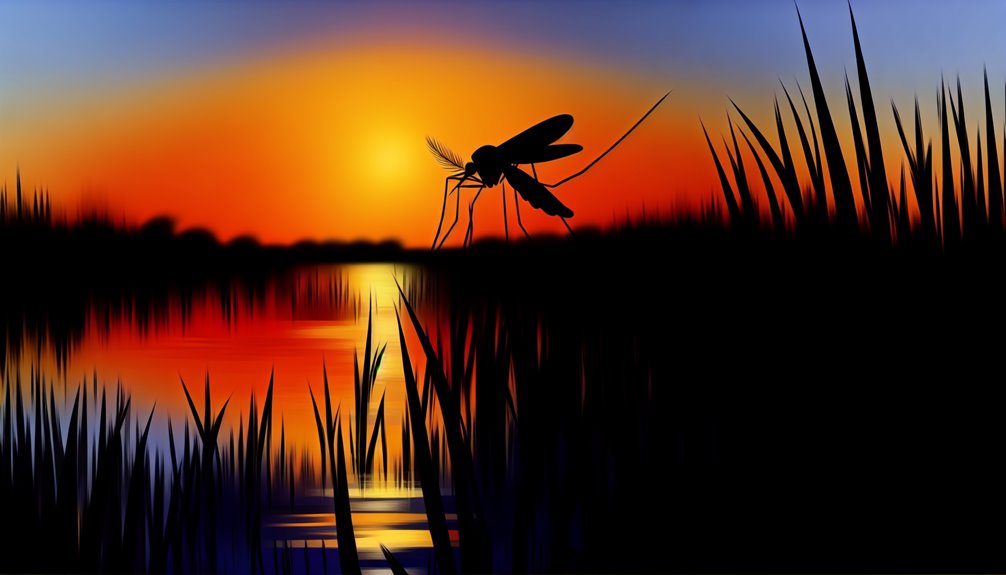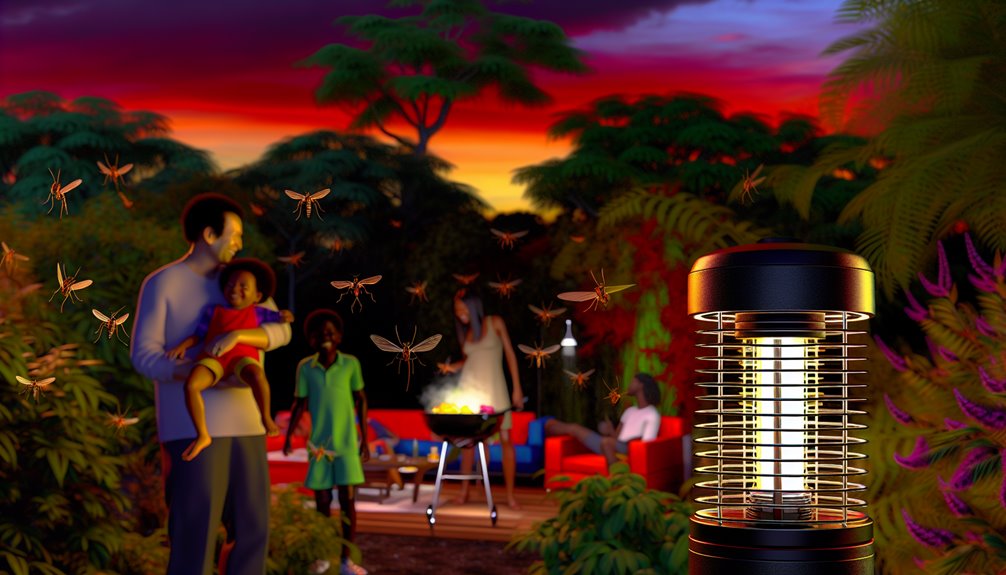In Mississippi, misconceptions about mosquito behavior can lead to ineffective strategies for managing these pests. Many believe mosquitoes only bite at night, or that rainy conditions reduce their populations. However, these myths can create a false sense of security. Understanding the realities behind these common beliefs is essential for better protection. As we explore the seven prevalent myths, you’ll discover how they impact your experience during mosquito season.
Mosquitoes Only Come Out at Night

While many believe mosquitoes only emerge after sunset, this common misconception overlooks their daytime activity.
In fact, certain species actively seek hosts during the day, particularly in shaded areas. Their behavior varies depending on environmental factors, including temperature and humidity, which can influence their nighttime activity as well.
When serving others, it’s essential to educate them about these patterns to reduce the risk of bites. Understanding mosquito behavior helps you implement effective prevention strategies, such as using repellents and wearing protective clothing during both day and night.
All Mosquitoes Are Attracted to the Same Scents
Although many people assume that all mosquitoes are drawn to the same scents, the reality is much more complex. Different species exhibit varying scent preferences, influenced by factors like their breeding habits and environmental conditions.
For instance, Aedes mosquitoes are particularly attracted to floral scents, while Anopheles mosquitoes may prefer body odors produced by sweat.
Understanding these nuances in mosquito behavior can help you tailor your prevention strategies effectively. If you want to minimize your exposure, consider using repellents that specifically target the scents that attract the species prevalent in your area.
Rainy Weather Means Fewer Mosquitoes

Many people believe that rainy weather reduces mosquito populations, but this isn’t entirely accurate.
In fact, rain patterns can create ideal conditions for mosquito breeding. After a rainfall, standing water often collects in various areas, providing perfect breeding sites for these pests. Mosquito eggs can hatch within days, leading to increased populations shortly after the rain subsides.
Additionally, certain species thrive in wet environments, making rainy periods a double-edged sword. While heavy storms might temporarily disrupt their activity, the subsequent accumulation of water fuels their reproduction.
Understanding this relationship helps you manage your outdoor plans and prepare for potential mosquito encounters. Instead of assuming rainy weather brings relief, stay informed and take proactive measures to mitigate mosquito breeding in your area.
Mosquito Bites Are Only a Nuisance
Some might think mosquito bites are just a pesky annoyance, but their impact goes beyond mere discomfort.
While the immediate itchy reactions can be frustrating, these bites can also lead to more serious health concerns. Mosquitoes are vectors for diseases like West Nile virus and Zika, which can affect not only you but also those around you.
This is why bite prevention is essential. Using repellents, wearing protective clothing, and eliminating standing water can greatly reduce your risk of bites and the potential transmission of diseases.
By being proactive in your approach to mosquito season, you’re not just safeguarding yourself; you’re also helping protect your community.
Don’t underestimate the importance of addressing mosquito bites seriously.
Bug Zappers Are Effective Against Mosquitoes

While you might assume that bug zappers effectively eliminate mosquitoes, the reality is more nuanced. Research shows that their effectiveness in mosquito control is limited. In fact, they often attract more beneficial insects than the pests you want to eliminate.
Here are three key points to contemplate regarding bug zapper effectiveness:
- Limited Attraction: Bug zappers primarily attract male mosquitoes, which don’t bite.
- Alternative Solutions: Reflect on using mosquito control alternatives like citronella candles, repellents, and natural predators.
- Integrated Approaches: Combining various methods, such as eliminating standing water and using traps, can enhance your mosquito management efforts.
Understanding these factors can help you make informed decisions for effective mosquito control this season.
You Can’t Get Bitten if You Stay Indoors
Although staying indoors can reduce your chances of getting bitten by mosquitoes, it’s not a foolproof solution. Indoor protection measures, like using window screens, are essential for keeping these pests at bay.
However, gaps or damages in your screens can allow mosquitoes to enter your home, exposing you to bites. Additionally, if you frequently open doors or windows, you increase the risk of inviting them inside.
It’s also important to remember that mosquitoes can be active in enclosed spaces, particularly if they’ve found a way in. To effectively minimize your risk, make certain your screens are intact and consider using air conditioning or fans to deter mosquitoes.
Ultimately, indoor protection is helpful, but it shouldn’t be your only line of defense.
Natural Repellents Are Always Safe and Effective
Indoor measures can help, but when you venture outside, you might consider using natural repellents as an alternative to chemical options.
However, it’s crucial to understand that natural repellent effectiveness can vary considerably.
Here are three herbal repellent options you might explore:
- Lemon Eucalyptus Oil: This oil has been shown to provide protection similar to DEET in some studies.
- Lavender Oil: Besides its pleasant scent, lavender often deters mosquitoes effectively.
- Citronella: A well-known option, citronella candles can help create a barrier but may not be as potent when used alone.
While these options can be safer, they aren’t always foolproof.
Always assess your environment and choose what’s best for your needs.
Conclusion
As the owner of Mosquito Eliminators of South MS, I genuinely believe that knowledge is your best defense against these pesky insects. By understanding the truths behind the myths, you’ll be better equipped to enjoy your time outdoors without worry. If you ever feel overwhelmed or just want to chat about the best ways to tackle mosquitoes this season, I invite you to visit us at mosquitoeliminatorsms.com or give me a call at (601) 336-2277. Together, we can make your outdoor spaces enjoyable and mosquito-free. Let’s take on the season with confidence!

